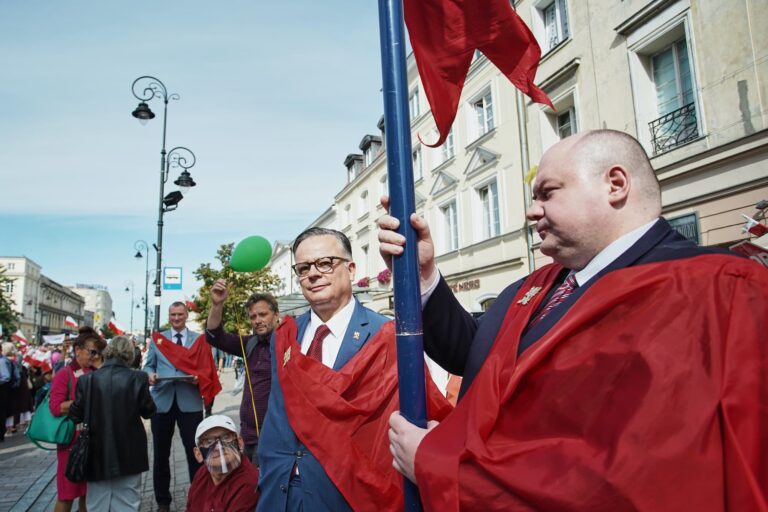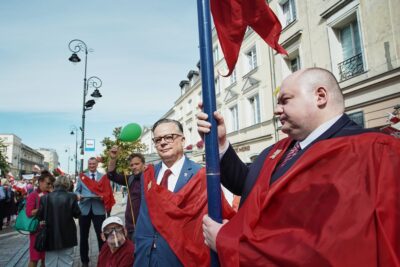Tens of millions of zlotys, expensive properties, and a behind-the-scenes war for influence and money – we reveal the financial dealings of an empire built in Poland by a group of Catholic fundamentalists. The group who also co-founded and supported Ordo Iuris, an organisation which undermines women’s rights to access abortion.
Warsaw, October 28. Wednesday is another day of protests that spread like lighting across Poland and mobilise the country’s women. Despite the pandemic, tens of thousands of angry people take to the streets. They are outraged by a ruling handed down by the country’s Constitutional Tribunal. It eliminated nearly all women’s rights to access abortion. The Polish Constitutional Tribunal’s move to ban abortion came as a result of the challenge from a group of conservative MPs from the ruling party (Law and Justice) and the actions of the influential organisation Ordo Iuris. There is a tangible feeling of anger – protesters carry signs with messages aimed at the organisation. Never before in modern history have Poles turned against their churches, defacing their walls.
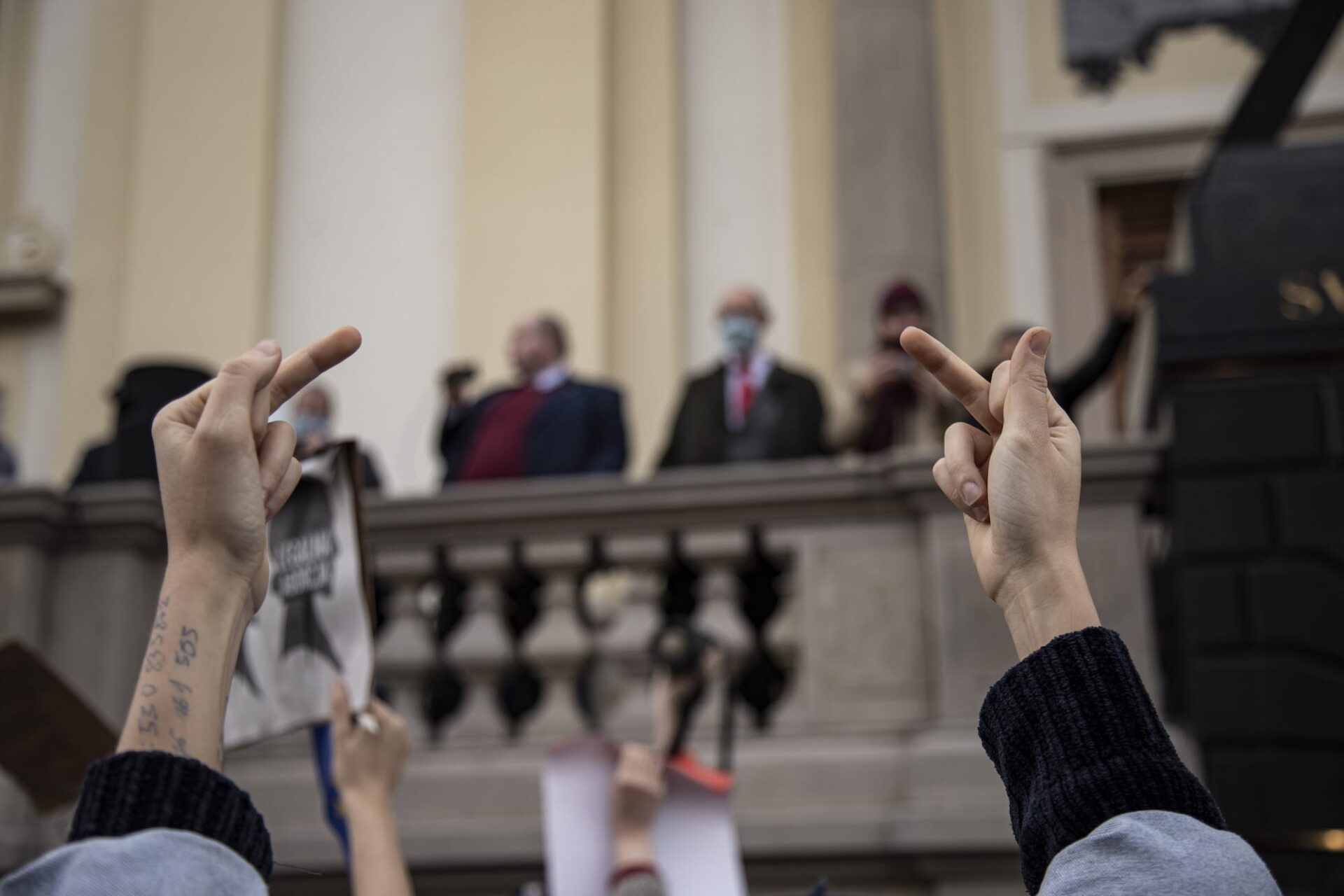
Protesters in front of the Church of the Holy Cross, Warsaw. Photo by Przemysław Stefaniak
On one of the streets in the heart of Warsaw, Krakowskie Przedmieście, a group of Catholic radicals and nationalists sporting shaven heads stand guard outside the Church of the Holy Cross to make sure that the protesters are prevented from entering the building. A passing cyclist stops near the church, flips her middle finger towards the church entrance and drives away. There is also a line of military police that cordons off the vicinity of the church. The nationalists hide behind their backs to the chants of ‘God, Honour and Fatherland!’.
Men in capes stand guard
The church door is guarded by a devoted and watchful group of praying people. The words of the prayer spill out a megaphone, while some people in red capes chant incessantly. Among them, ultra-Catholic radicals Jędrzej Stępkowski and Maciej Maleszyk, heads of an organisation called Piotr Skarga Foundation Institute of Social and Religious Education. Next to them, in a grey overcoat, prays Fernando Antunez Aldunate, an activist of the Foundation. Polish journalists have long called people associated with that group Skargowcy, or those from the Piotr Skarga Foundation.
The people in red capes look exotic, reminiscent of a group that re-enacts some ancient medieval society. In reality, however, the message spread by people who stand outside the church reaches millions of people while the organisation’s assets amount to millions of zlotys.
The fact that Skargowcy have accumulated such wealth has so far not been made public. The Skarga Foundation is not a business enterprise, it is an entity supported with donations and according to the Polish law, it does not have to disclose its assets. Although Polish journalists have spent two decades trying to discover the scope of its wealth, they have been unable to learn anything, as their questions remained unanswered.
The organisation has recently remained torn by internal conflicts, which allowed us to gain exclusive access to highly sensitive information about its wealth. The wealth that propelled it to become highly influential.
Elegant streets, expensive houses
Zawoja, a village near the massif of Babia Góra in southern Poland. A three-story building the size of a church is visible in the distance. Its new red roof stands out against a backdrop of forests and peaks of the Beskidy mountains. It is the crowning jewel of the Piotr Skarga Foundation, one of its latest investments. The luxurious training centre was completed three years ago and is estimated – according to documents we accessed – at least PLN 10 million (more than EUR 2.2 million).
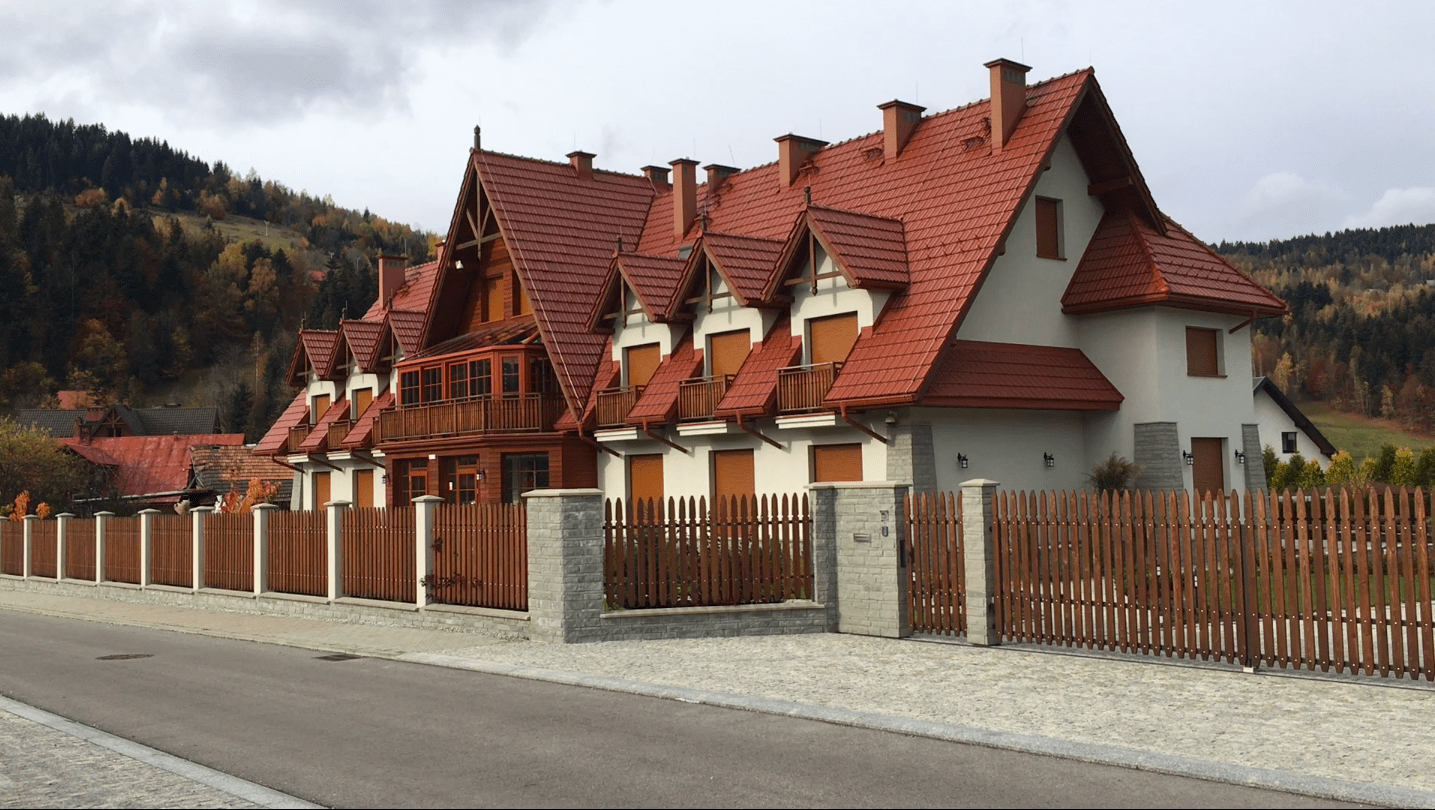
Zawoja training centre. Photo by Konrad Szczygieł/Reporters Foundation
The training centre is not accessible to the public. Its curtained windows are a telltale sign that the owners do not expect any visitors. A statue of Mary, located in the middle of the well-kept garden, reflects beams of sunlight.
‘The centre is empty every day’ says a janitor, who emerges after I press a button on the intercom. He explains that the centre cannot rent rooms or organise meetings. It is used only by the Foundation, which sometimes chooses it as a conference venue.
The Foundation bought it in 2015 for PLN 890,000, renovated using donated funds. Still, it had to take out an additional loan of PLN 3 million to foot the redecoration bills.
The property is the main part of assets owned by the Skarga Foundation – according to internal calculations of the organisation, the portfolio of properties is worth approximately PLN 23 million (over EUR 5.1 million).
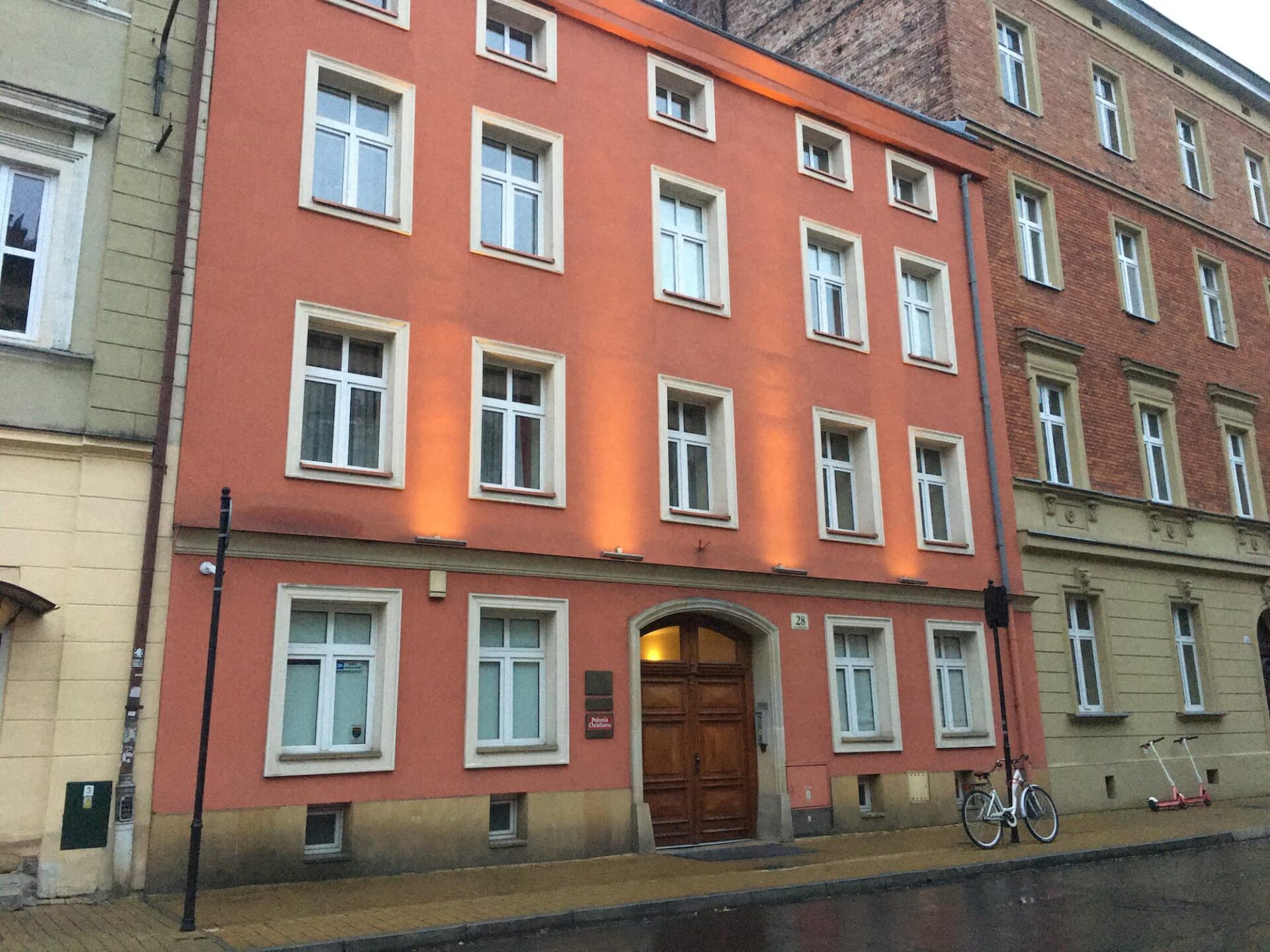
A a nineteenth-century house in the heart of Kraków’s historic district of Kazimierz. Photo by Konrad Szczygieł//Reporters Foundation
The most valuable property is a nineteenth-century house in the heart of Kraków’s historic district of Kazimierz – it has long served as the seat of the Foundation and the Piotr Skarga Association (the organisations, with eerily identical names, were founded 20 years ago by the same people). Today, the impressive two-storey building is worth over PLN 6 million.
How to own a property
The interior of the house owned by Skargowcy and their headquarters is impressive, it has stone floors and heavy wooden doors. An employee of the Foundation who opens the front door reveals that the names of the donors who supported the building’s renovation can be found on a golden plaque placed near the entrance. Skargowcy collected nearly PLN 2 million for that purpose. Journalists will not be allowed to advance any further than the hall. An employee of the Foundation thanks us for our visit and suggests that should we have any questions, we can reach out to the organisation by mail.
Just a stone’s throw away, in 2010, the Foundation bought two apartments, each worth nearly PLN 1 million. One of the apartments has been turned by Skargowcy into an office used to organise meetings with their sympathisers. It is unknown what purpose the second apartment serves. Apart from both properties, they rent several additional ones throughout Poland: two in Warsaw, one in Wrocław and one in Białystok.
Property ownership is an important but not the only element of Skargowcy‘s portfolio. They also paid a total of over PLN 3 million for office equipment, server rooms and eight company cars.
What is the source of that wealth? Well, they are masters of direct marketing. They sell devotional medals, rosaries and pictures with the images of saints (their favourite is Our Lady of Fatima, who often becomes ‘the face’ of their marketing campaigns). The Foundation posts them to recipients throughout Poland from its shipping centre, the construction of which is estimated to have cost over PLN 4 million.
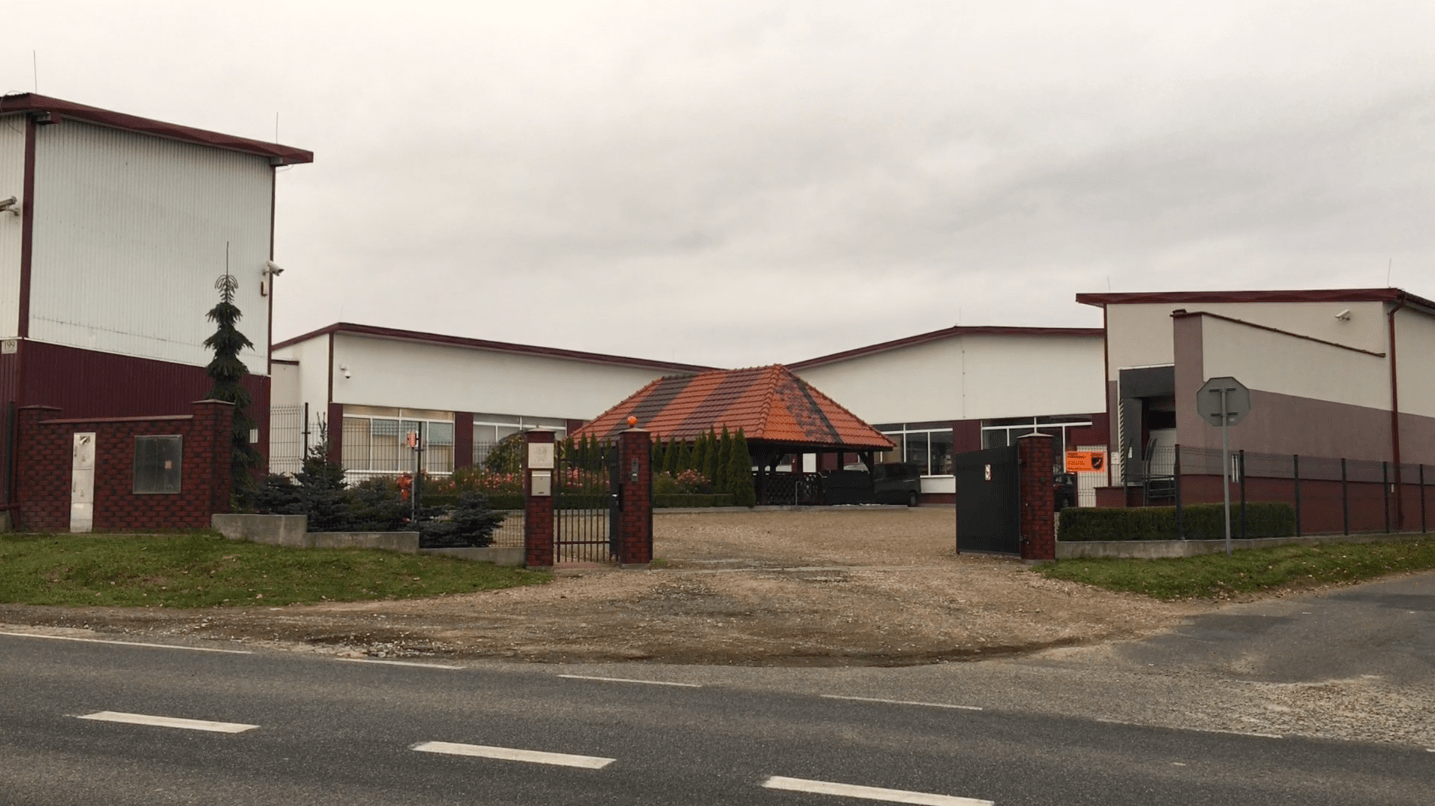
The shipping centre consists of three modern warehouses. Photo by Konrad Szczygieł//Reporters Foundation
The shipping centre is really impressive. It consists of three modern warehouses filled endless rows of shelves with cardboard boxes full of devotional items.
When we arrive at the centre, a young boy opens the door for us.
‘Is it possible to talk to someone who is in charge of the shipments?’ we ask.
‘They do not normally come here during the pandemic,’ he tells us.
He promises to let those in charge know we have paid them a visit and takes my business card but nobody ever calls me back.
Managers of devotional merchandise
We discover the value of property owned by Skargowcy from the Foundation’s financial report. It was filed for a court trial, the result of a feud between two conflicting groups in the organisation, who started fighting over power and money.
The report is incomplete, it covers only four years (2014-2018), but is the only available document that reveals the state of its finances.
The sums are large because the Foundation generates enormous profit and its income from donations remains unwaveringly high. In 2014-2018, the Foundation’s account was credited with a total of nearly PLN 200 million (EUR 44.5 million), Caritas Polska, on the other hand, a large-scale Catholic relief organisation in Poland, had an income of about PLN 245 million in the same period.
In 2018 alone, donations transferred into the Foundation’s account amounted to PLN 40 million (EUR 8.8 million).
How did Skargowcy‘s business empire grow? It was an impressive feat. In 2014, donations that amounted to PLN 34.5 million were transferred into the Foundation’s account. In 2015, it was supported by PLN 36.5 million, and in 2016 – PLN 38.5 million. A year later, the Foundation received a record amount of PLN 49 million. The number of employees also point to the scale of its business activity – at the end of 2018, it had 83 full-time employees. Its three management board members had comfortable salaries that might be compared to those of full-time professional managers in a corporate world, earning a total of PLN 35,000 a month.
However, the proceeds from donations were not fully entered into books as pure profit – most of that money was invested by Skargowcy, including in mail-order business and properties, a move that has since turned into lengthy litigation.
Business model: free donation
The Piotr Skarga Foundation was established in 2001 in Kraków. It is made up of activists from its sister Piotr Skarga Association of Christian Culture (SKCH for short). Why was it established? To spread Christian faith and defend traditional values. Skargowcy follow the principles Tradition, Family, Property (TFP), an international movement with roots in Latin America that promotes ultra-Catholic values, strives to ban abortion and limit LGBT rights.
Skargowcy’s involvement in the TFP movement is attested by the presence of Caio Xavier de Silveira and Matthias von Gersdorff, TFP leaders in France and Germany, who sit on the Foundation’s supervisory board. They were the founders who provided start-up funds, shared know-how on how to effectively conduct mail-order campaigns and successfully collect money from the Catholic community in Poland.
The Foundation and the Association are two branches of the same closely knit group. From the beginning, both organisations have been managed by university friends – Sławomir Olejniczak, Sławomir Skiba and Arkadiusz Stelmach. They were monarchists, activists of a rather vague Conservative-Monarchist Club and former journalists of a niche Catholic newspaper Nasz Dziennik.
The paths of monarchists and TFP crossed in the early 1990s, when Leonard Przybysz, a delegate from a Brazilian organisation was looking for possible partners in Poland. Przybysz brought the ideas of TFP to Poland and then joined the supervisory boards of both the Foundation and the Association.
Skargowcy initially ran a mail-order bookstore and published a religious bimonthly Polonia Christiana as well as managed PCH24.pl – a website that was the publisher’s online branch.
A prayer for sale
They also quickly found their market niche: they regularly sent cheap medals, pictures of Our Lady of Fatima and saints, books and rosaries to hundreds of thousands of people. They encouraged them to participate in Catholic actions, prayers and pilgrimages. How much were they supposed to pay? They were only asked for a ‘free donation’. Skargowcy attached a printed form with details of how to transfer the donated money and a letter that encouraged the recipients of the package to do so. The success of direct mailing, as Skargowcy call it, lies primarily in the scale of operations. Over the years, packets sent by the Foundation reached millions of households across the country. In 2018 alone, they sent over 1 million door drop flyers and several hundred thousand envelopes that contained calendars, medals and brochures.
In the early 2000s, the foundation understood, much as the American giant Amazon, that the customer database is a pivotal element of success. Today, they reap the harvest of years of large-scale direct mailing campaigns.
Neither the Skarga Foundation nor the Association has had any formal links with the Catholic Church. Skargowcy call themselves a lay Catholic movement.
Do the donors realise that the money they transfer to the Foundation account is spent on expensive investments, such as the centre in Zawoja? “The donors received flyers that discussed the entire project and explained in detail the goals and timeline of the construction process. All areas of extensive cultural and formative activities of the Foundation and Association were described in the letters sent to our donors”, an employee of the Piotr Skarga Foundation claims in response to our questions.
If this is not a secret, why, over the years, the Foundation has refused to disclose any reports on the assets it held? “There was no such requirement for an organisation that is not a business enterprise”, we read in the email.
A schism in Kraków
Today, a fierce court battle is fought over the fortune accumulated from the sales of medals depicting Our Lady of the Fatima. In short, the conflict arose between the founders associated with the TFP (supervisory board) and the Polish monarchists (who sat on the management board).
May 2019. It was almost midnight when Leonardo Przybysz, 78, a member of the supervisory board of the Piotr Skarga Foundation, received an e-mail, which invited him to a meeting. The invitation came unexpectedly – the board is to meet over fifteen hundred kilometres away, in Paris, the following day. Przybysz replied: ‘Salve Maria! Gentlemen, please forgive my absence.’
Despite his absence, the meeting went as planned. Its other members, Caio Xavier de Silveira and Matthias von Gersdorf, recalled the management board. This means that the founders and long-time heads of the Foundation were forced out. They include Sławomir Olejniczak, Sławomir Skiba and Arkadiusz Stelmach. They are now replaced by young activists: Jędrzej Stępkowski and Maciej Maleszyk, as well as a longtime activist of the TFP movement, Fernando Antunez Aldunate.
It was a coup d’état. What triggered such a move? The Foundation had been torn by months-long conflicts. Its supervisory board, which has the powers to dismiss the management board and controls what is happening in the Foundation on an ongoing basis, had not been receiving financial reports in a timely manner. Also, it was not updated on what the management was up to.
The young take over
The power struggle does not only involve positions and some substantial salaries – the person who runs the foundation is responsible for managing its large assets. They also have access to bank accounts where donations are transferred. And most importantly, they control the Foundation’s crowing gem, the database of donors.
At the end of 2018, the supervisory board reached out to Sławomir Olejniczak and offered him an annual leave. The management board turned the offer down. Soon afterwards, in February 2019, Olejniczak quietly – through donation agreements – began to transfer assets from the Foundation to the Association, which he still controls. He kept this under wraps from the supervisory board.
When the supervisory board dismissed the ‘old’ management, Olejniczak chose not to lay down his arms. While the former management board members choose to litigate, the “new” management board filed a complaint with the prosecutor’s office. In October 2019, the prosecutor’s office launched an investigation – however, the proceedings were discontinued after a year when the prosecutor office found no unlawful actions were taken by the old management board.
Who wins the tug-of-war? For now, there is a draw with a slight advantage held by the old management. Although the Foundation is now managed by the new board, the assets remain in the hands of the Association, supervised by the former management board members.
The chairman is in charge, or is he?
Some of the money collected by Skargowcy supports Ordo Iuris Institute. The institute was founded with the support of Stelmach, Skiba and Olejniczak in 2013. Ordo Iuris received its start-up funding from Skargowcy, they also continued to support the Warsaw-based Institute until it became financially independent.
Ordo Iuris members resent it when journalists evoke the Institute’s historical ties with the Skarga Foundation. As it turns out, however, in a dispute with the ‘new management board’, the former heads of the Foundation management board are supported by the head of Ordo Iuris.
In December 2019, during a meeting of plenipotentiaries of the Piotr Skarga Foundation supervisory board, Leonard Przybysz, who backed the old management board, is represented by Jerzy Kwaśniewski, a Catholic lawyer and the head of Ordo Iuris.
Several times during the meeting, the chair of the meeting, Justyna Stępkowska, reminded the attorney not to interrupt her and not to raise his voice. According to the transcript of the meeting, there was a struggle and the documents were ripped. Someone shouted at Kwaśniewski in English: ‘You have no honour! You attacked this woman!’.
After the meeting ended, the chairwoman was examined by a physician. The doctor later said that she had ‘developed a strong stress reaction.’
What does the head of Ordo Iuris – who often complains about LGBT violence and aggression – say about the exchange? ‘It is difficult to respond to the statement about the stress felt by Ms Stępkowska, but there is little doubt that the Foundation supervisory board meeting chaired by Ms Stępkowska was unlawful,’ Kwaśniewski wrote in an email. He added that the record of the meeting fails to prove that he behaved inappropriately.
Stępkowska has not responded to our request for comment.
Knight’s legacy
To what extent can Skargowcy influence Ordo Iuris’s activities? Both they and Ordo Iuris argue that any influence is negligible. ‘As members of the [supervisory board] of Ordo Iuris, they have an advisory role, but do not manage the activities of the Institute,’ replied Piotr Kucharski who represents the Piotr Skarga Foundation.
Kwaśniewski, the current head of Ordo Iuris, explains that his organisation is independent, and recent changes to its statute have limited any leverage held by Skargowcy.
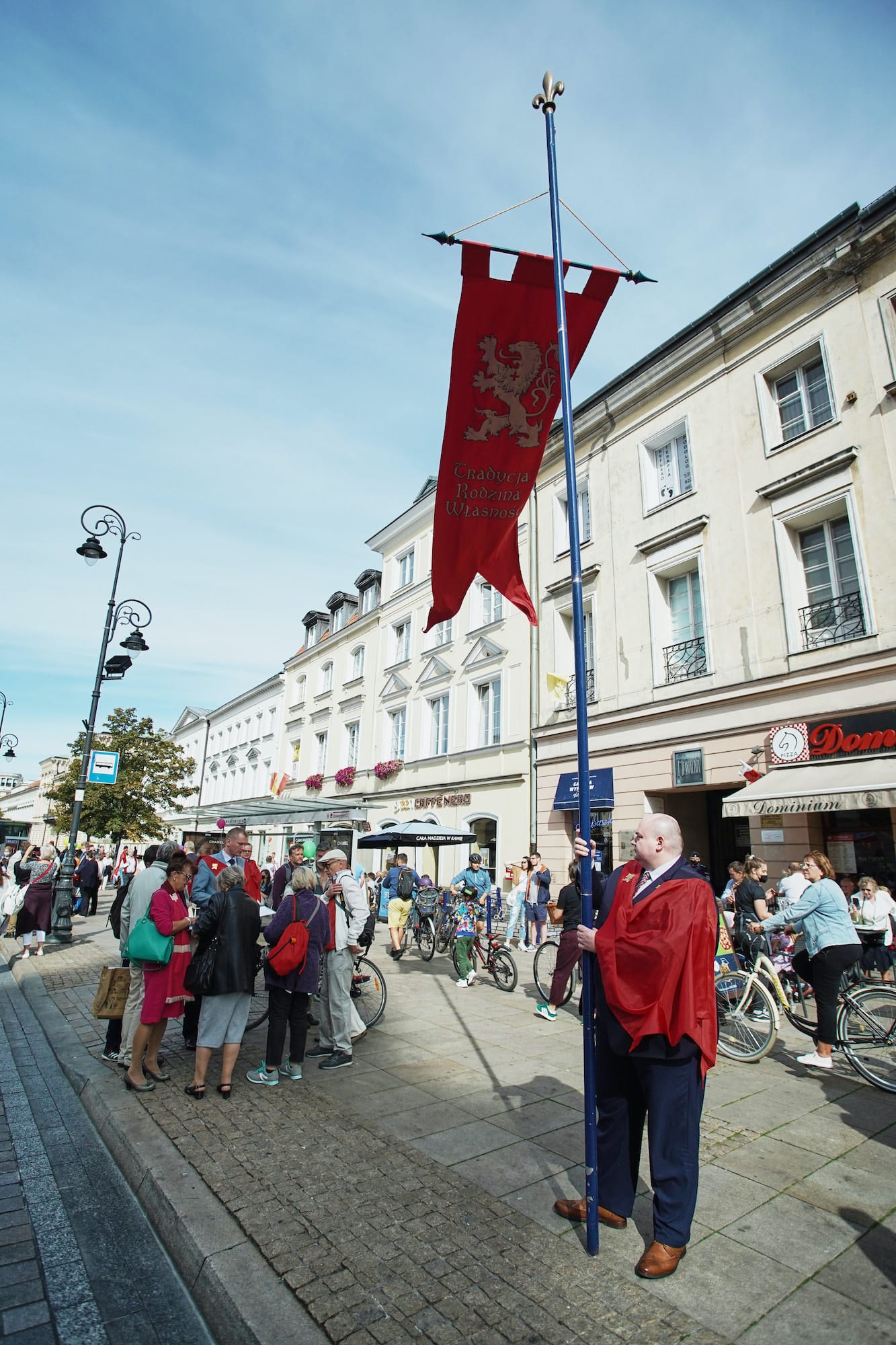
A flag of Piotr Skarga Foundation Institute of Social and Religious Education during a March for Life and Family, 20.09.2020, Warsaw. Photo by Reporters Foundation
In 2013, Skargowcy registered a distinctive logo with a golden lion’s head set against a blue background that represents lawyers. It is a mirror image of the logo of a lion on a red background, which symbolises the TFP movement around the world. And apart from providing some start-up funding to Ordo Iuris, they chose to hire Professor Aleksander Stępkowski to work at the Skarga Foundation. Today, Stępkowski is a judge of the Polish Supreme Court and its spokesman.
Do Skargowcy wield little influence over Ordo Iuris? Their funds have supported the organisation from the time it was founded until 2018. How much did they transfer? We have determined that in 2019 Skargowcy made the last transfer to the Ordo Iuris of PLN 50,000 for the renovation of an office in downtown Warsaw.
Kraków, October 2020. I approach Sławomir Skiba, Vice-President of the Association when he is leaving the premises of Skargowcy.
“I’d like to talk about the conflict in the organisation,” I begin.
Skiba hesitates for a moment, then walks away, explaining that he is in a hurry.
“Send me an email, please,” he says before he gets in a luxury limo and drives away.
Skargowcy maintain a public image of modest citizens who go by God’s rules. When they appear in public, they often want to leave behind a dignified aura, so quite often they organise their meeting on castle ground. A video that looks back on what they achieved in 2019 posted to their website, was shot reminiscent of the interior of a stately manor. If they meet with associated organisations from Europe, they choose the Royal Castle in Niepołomice near Kraków. If they send young people to a summer camp, a chivalrous atmosphere is a must.
A rosary recited just round the corner
Who is currently in charge of the Foundation? Piotr Kucharski, an activist of Skargowcy says that the case is disputed.
The new management board, which the supervisory board anointed to take control over the Foundation, resides in an ordinary apartment in central Warsaw.
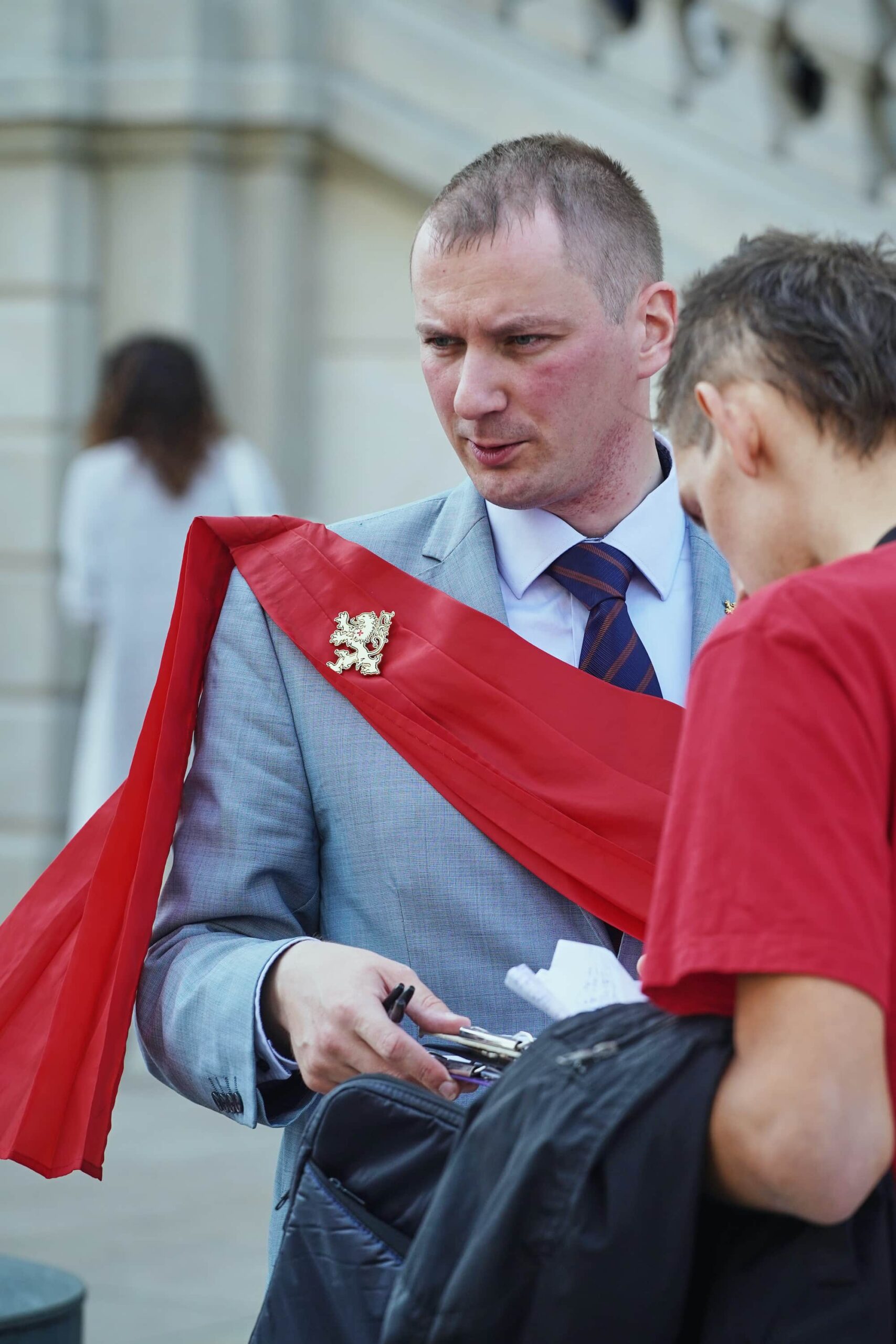
Maciej Maleszyk during a March for Life and Family, 20.09.2020, Warsaw. Photo by Reporters Foundation
Maciej Maleszyk, the Foundation’s official vice president, opens the door. We might sometimes meet him when he recites the rosary outside the church in his usual spot, just 20 meters away as the crow flies.
“Come in an hour, I’ll talk to you,” he promises.
He calls back after a moment and is hardly able to hide his emotions as he fumes: “Who gave you the address of our Warsaw office?” Yet, he calls again a moment later. “You wrote some negative things about organisations such as ours, we have nothing to talk about,” he quips and hangs up.
Maleszyk, however, replies to the questions I send him: “Piotr Skarga Institute of Social and Religious Education does not answer any questions that could have legal consequences. The Foundation considers this attitude as a priority to be able to focus its efforts on achieving its goals.”
Apart from Maleszyk, the organisation is managed by Jędrzej Stępkowski. Both under 40, they had been members of conservative and monarchist groups. Jędrzej Stępkowski is the brother of Professor Aleksander Stępkowski, the founder of Ordo Iuris and a judge who adjudicates on the Polish Supreme Court.
A resident of Chile with a grudge against LGBT
Although hardly anyone in Poland has heard about Stępkowski junior, Maciej Maleszyk has already made an imprint in the Polish media. In 2013, he called the police reporting a girl who hinted he should visit a nearby go-go club. The policemen took the case to court because they considered Maleszyk’s call as lacking legal ground. Rafał Dorosiński, a lawyer associated with Ordo Iuris and the head of the Piotr Skarga Foundation defended him in court.
Fernando Antunez Aldunate is the most mysterious figure on the ‘new’ management board of Skargowcy. He is a 70-year-old Chilean national, who has been associated with the Polish branch of TFP since 2006. Although his involvement can be traced to the activities of the Brazilian and Italian branches of TFP, he most often appears in the company of Stępkowski and Maleszyk, outside the Warsaw church situated close to their offices. In October, the trio ‘defended’ the church against protesting women.
Aldunate, an inconspicuous figure in a grey cloak with a golden lion pin in his lapel, can be seen in the photos taken during the August street protests in Warsaw after the arrest of Margot, an LGBT activist. He took part in a scuffle with a group of Margot’s supporters.
Although he supports the ‘new’ board of Skargowcy, Fernando’s has over five decades of experience as a member of TFP. He joined the Brazilian organisation shortly after it was founded at the age of 15. In 2006, he became a senior consultant at the Piotr Skarga Institute.
Who will ultimately win the power struggle for influence and money? The old management, based in Krakow, is still active and considered lawful. The ‘new’ management board members regularly recite the rosary with the movement’s sympathisers in downtown Warsaw.
Their chants are carried high above the heads of people in red capes, where a red TFP banner with a golden lion proudly flies, advertising.
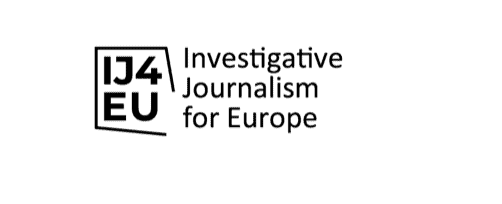
This story is a part of a project supported by Investigative Journalism for Europe grant (IJ4EU)
Read in Polish: wp.pl
Konrad Szczygieł is an investigative journalist at FRONTSTORY.PL. Previously, he was a reporter at Superwizjer TVN and OKO.Press. Since 2016, he has worked with Fundacja Reporterów (Reporters Foundation). He was shortlisted for a Grand Press award (2016, 2021) and an Andrzej Woyciechowski award (2021). He is based in Warsaw.


